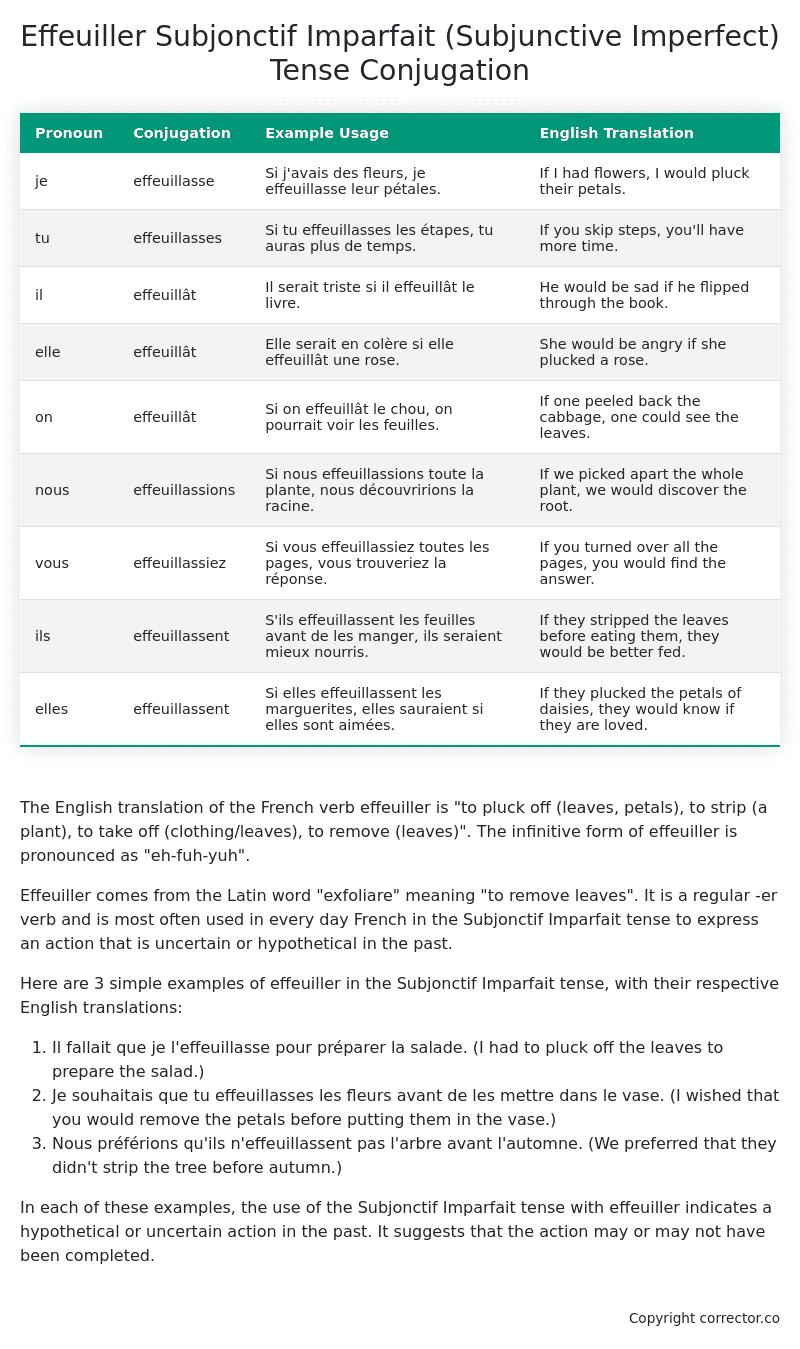Subjonctif Imparfait (Subjunctive Imperfect) Tense Conjugation of the French Verb effeuiller
Introduction to the verb effeuiller
The English translation of the French verb effeuiller is “to pluck off (leaves, petals), to strip (a plant), to take off (clothing/leaves), to remove (leaves)”. The infinitive form of effeuiller is pronounced as “eh-fuh-yuh”.
Effeuiller comes from the Latin word “exfoliare” meaning “to remove leaves”. It is a regular -er verb and is most often used in every day French in the Subjonctif Imparfait tense to express an action that is uncertain or hypothetical in the past.
Here are 3 simple examples of effeuiller in the Subjonctif Imparfait tense, with their respective English translations:
- Il fallait que je l’effeuillasse pour préparer la salade. (I had to pluck off the leaves to prepare the salad.)
- Je souhaitais que tu effeuillasses les fleurs avant de les mettre dans le vase. (I wished that you would remove the petals before putting them in the vase.)
- Nous préférions qu’ils n’effeuillassent pas l’arbre avant l’automne. (We preferred that they didn’t strip the tree before autumn.)
In each of these examples, the use of the Subjonctif Imparfait tense with effeuiller indicates a hypothetical or uncertain action in the past. It suggests that the action may or may not have been completed.
Table of the Subjonctif Imparfait (Subjunctive Imperfect) Tense Conjugation of effeuiller
| Pronoun | Conjugation | Example Usage | English Translation |
|---|---|---|---|
| je | effeuillasse | Si j’avais des fleurs, je effeuillasse leur pétales. | If I had flowers, I would pluck their petals. |
| tu | effeuillasses | Si tu effeuillasses les étapes, tu auras plus de temps. | If you skip steps, you’ll have more time. |
| il | effeuillât | Il serait triste si il effeuillât le livre. | He would be sad if he flipped through the book. |
| elle | effeuillât | Elle serait en colère si elle effeuillât une rose. | She would be angry if she plucked a rose. |
| on | effeuillât | Si on effeuillât le chou, on pourrait voir les feuilles. | If one peeled back the cabbage, one could see the leaves. |
| nous | effeuillassions | Si nous effeuillassions toute la plante, nous découvririons la racine. | If we picked apart the whole plant, we would discover the root. |
| vous | effeuillassiez | Si vous effeuillassiez toutes les pages, vous trouveriez la réponse. | If you turned over all the pages, you would find the answer. |
| ils | effeuillassent | S’ils effeuillassent les feuilles avant de les manger, ils seraient mieux nourris. | If they stripped the leaves before eating them, they would be better fed. |
| elles | effeuillassent | Si elles effeuillassent les marguerites, elles sauraient si elles sont aimées. | If they plucked the petals of daisies, they would know if they are loved. |
Other Conjugations for Effeuiller.
Le Present (Present Tense) Conjugation of the French Verb effeuiller
Imparfait (Imperfect) Tense Conjugation of the French Verb effeuiller
Passé Simple (Simple Past) Tense Conjugation of the French Verb effeuiller
Passé Composé (Present Perfect) Tense Conjugation of the French Verb effeuiller
Futur Simple (Simple Future) Tense Conjugation of the French Verb effeuiller
Futur Proche (Near Future) Tense Conjugation of the French Verb effeuiller
Plus-que-parfait (Pluperfect) Tense Conjugation of the French Verb effeuiller
Passé Antérieur (Past Anterior) Tense Conjugation of the French Verb effeuiller
Futur Antérieur (Future Anterior) Tense Conjugation of the French Verb effeuiller
Subjonctif Présent (Subjunctive Present) Tense Conjugation of the French Verb effeuiller
Subjonctif Passé (Subjunctive Past) Tense Conjugation of the French Verb effeuiller
Subjonctif Imparfait (Subjunctive Imperfect) Tense Conjugation of the French Verb effeuiller (this article)
Subjonctif Plus-que-parfait (Subjunctive Pluperfect) Tense Conjugation of the French Verb effeuiller
Conditionnel Présent (Conditional Present) Tense Conjugation of the French Verb effeuiller
Conditionnel Passé (Conditional Past) Tense Conjugation of the French Verb effeuiller
L’impératif Présent (Imperative Present) Tense Conjugation of the French Verb effeuiller
L’infinitif Présent (Infinitive Present) Tense Conjugation of the French Verb effeuiller
Struggling with French verbs or the language in general? Why not use our free French Grammar Checker – no registration required!
Get a FREE Download Study Sheet of this Conjugation 🔥
Simply right click the image below, click “save image” and get your free reference for the effeuiller Subjonctif Imparfait tense conjugation!

Effeuiller – About the French Subjonctif Imparfait (Subjunctive Imperfect) Tense
Formation
Common Everyday Usage Patterns
Interactions with Other Tenses
Subjonctif Présent
Indicatif Passé Composé
Conditional
Conditional Perfect
Summary
I hope you enjoyed this article on the verb effeuiller. Still in a learning mood? Check out another TOTALLY random French verb conjugation!


